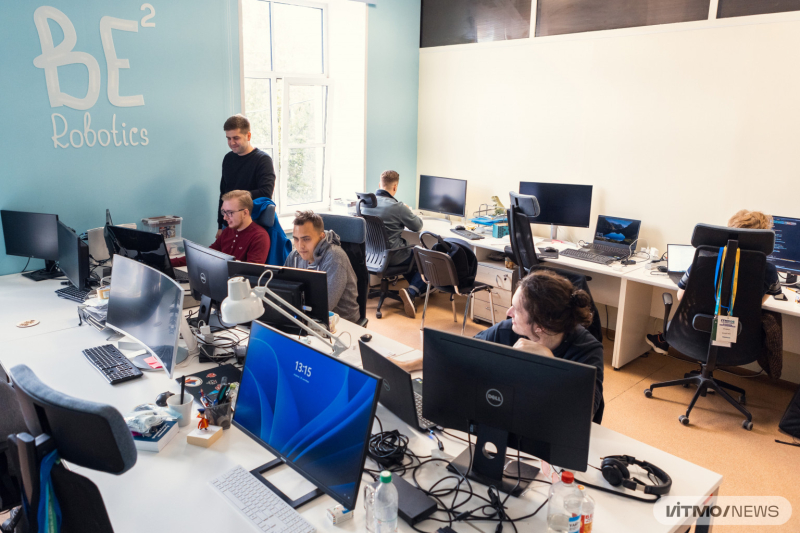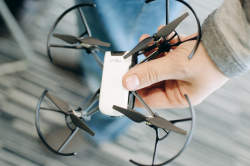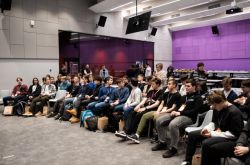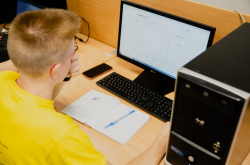Contents:
- What is robotics?
- How do I take part?
- What are the stages of the contest?
- What’s new this year?
- How can I prepare?
- What will winners get?
- Which areas of robotics are pursued at ITMO?
What is robotics?
This is a field in which robots are designed and used to assist humans in a variety of ways, such as welding parts at factories, carrying heavy loads at warehouses, studying the surface of Mars, or delivering food to offices.
As a wanna-be robotic specialist, you need to be an engineer and programmer, as well as be well-versed in mechanics, coding, sensorics, data processing, automatic control theory, artificial intelligence, and electronics to build a robot and program it to perform specific tasks.
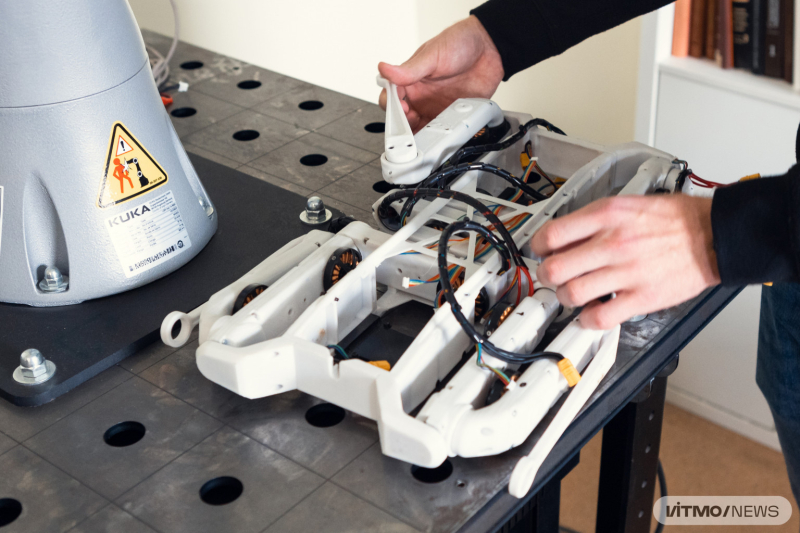
Students at the Faculty of Control Systems and Robotics are also working on robot dogs. Photo by Dmitry Grigoryev / ITMO.NEWS
How do I take part?
The competition is designed for Bachelor’s, Master’s, and Specialist’s students who study full-time, part-time, or remotely at Russian universities.
Registration will remain open until November 14. To participate in the contest, you need to fill out a registration form using your Yandex account, select the fields you are interested in (the number isn’t limited), and upload a document confirming that you are a student at a Russian university.
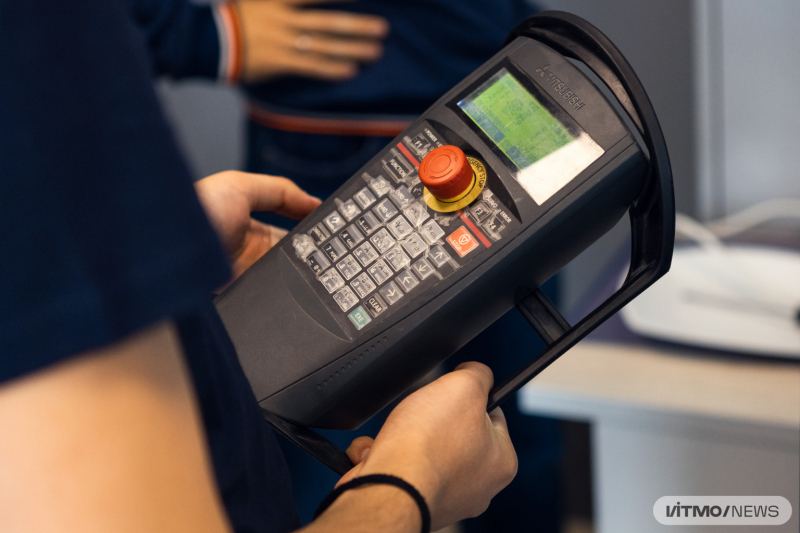
A laboratory at the Faculty of Control Systems and Robotics. Photo by Dmitry Grigoryev / ITMO.NEWS
What are the stages of the contest?
Although last year’s tasks are only revealed on the day of the current competition, competitors can review the tasks from previous years, as well as the latest demos, which will be up on the contest’s website in the coming week.
The Robotics track consists of several stages:
The qualifying round will run online from November 17 to December 3. Last year’s qualifying round featured ten tasks, nine of which were multiple-choice and the last one was to write a Python or C++ code. The contest’s tasks span the key branches of robotics:
- kinematics;
- dynamics;
- sensor data processing;
- automatic control theory;
- algorithms for kinematics and trajectory planning.
In the semifinals last year, students had three days to develop a technical solution in C++ or Python that included an algorithmic and software system for managing and analyzing data coming from sensors.
Though the tasks assigned to Bachelor’s and Master’s students varied, they were all designed to evaluate participants’ ability to implement algorithms for planning and control of robot motion, as well as solve the issues related to gathering and processing sensory data.
Bachelor’s students had to write a code for a robotic platform to collect as many bags of potatoes scattered across a field as possible and transport them to a hangar. The catch was that the robot had to move along an uneven surface full of obstacles. Participants received points for each delivered bag and lost points for collisions with obstacles. The judges also considered the quality and originality of the code.
Master’s students, on the other hand, needed to build a control program for a complex robotic system that consisted of a robot manipulator and mobile robot. The ceiling-mounted robot manipulator was supposed to relocate potato bags from unloading to a loading zone where mobile platforms would pick them up and move them to storage sites marked with specific colors: red, orange, yellow, green, or blue. Points were awarded for each bag loaded on a mobile platform and each successful delivery to a loading zone and were taken off for misdelivery and collision with obstacles. The code’s quality and originality were taken into account, as well.
The final round included an online defense in which contestants presented their solutions to the judges.
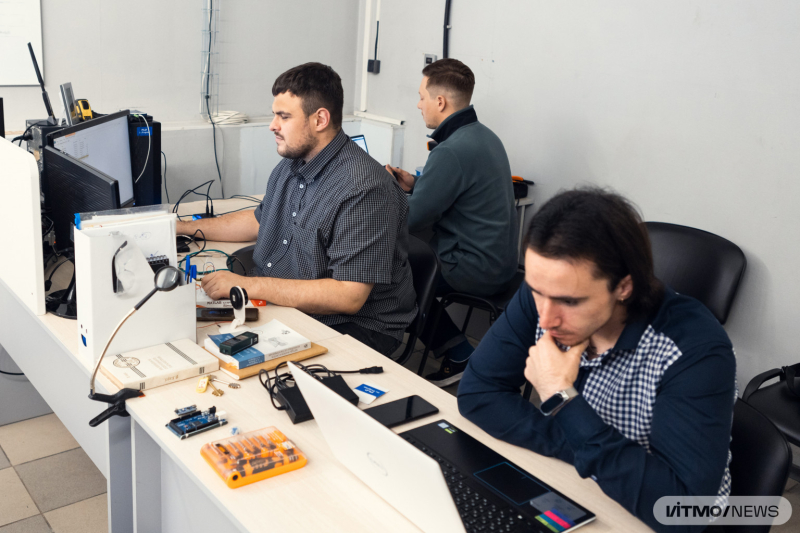
A laboratory at the Faculty of Control Systems and Robotics. Photo by Dmitry Grigoryev / ITMO.NEWS
What’s new this year?
As shared by Islam Bzhikhatlov, this year’s tournament will have two key modifications; the first being that the qualifying round’s tasks will now focus on both theoretical and practical knowledge. It means that participants will be expected to understand both the fundamental physical phenomena and their applications, which will help them prepare for practical tasks and qualify for the semifinals and the final round.
Better still, the final round will be held on-site. The contest’s finalists will gather at ITMO University to incorporate their solutions into physical robots and showcase the quality and efficacy of their projects to representatives of renowned robotics companies.
How can I prepare?
- look into the resources from previous years, including webinars on prepping for the qualifying round and semifinals (part 1 and part 2), as well as literature, online courses, and libraries listed in the webinars;
- follow the tips from former winners;
- study the demos from last year’s qualifying round.
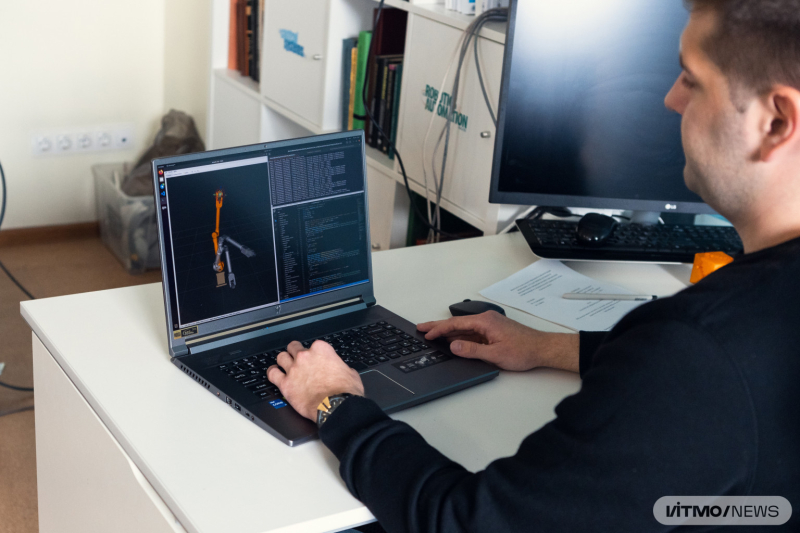
A laboratory at the Faculty of Control Systems and Robotics. Photo by Dmitry Grigoryev / ITMO.NEWS
What will winners get?
Medalists, winners, and runners-up will get cash awards ranging from 100,000 to 300 rubles, depending on their score and category. Medalists will also receive participation certificates and access to the contest’s career development center, where they will find updates on job offers and internships at partner companies, interact with HR experts, as well as take part in online events and tours of various businesses.
All of the above will get extra points when applying to Russian universities, including ITMO. As of now, the university offers several robotics programs:
Robotics and Artificial Intelligence (for Bachelor’s). The program teaches students to program microprocessor control units, design robotic systems, as well as develop and implement digital control systems in robots, manipulators, drones, ships, cars, and planes. Graduates become software technicians, engineers, and motion control and navigation system specialists.
Robotics and Artificial Intelligence (for Master’s, in collab. with Sberbank). The program trains future researchers and developers with competencies at the intersection of robotics and artificial intelligence who can develop mathematical and algorithmic software to design, optimize, and humanize robots and navigation systems.
Systems Analysis and Control (for Master’s). The program aims to equip students with fundamental competencies in systems analysis, as well as control and robotics, to solve complex tasks. It includes two modules: Master’s and PhD studies (for future scholars) and online studies (for students striving to gain expertise in systems analysis, control, and robotics).
Electric Drive Engineering (for Master’s, online). In the program, students thoroughly study electric motor management systems, software, and hardware, as well as control systems to become engineers, designers, and service engineers well-qualified to program and design electromechanical systems.
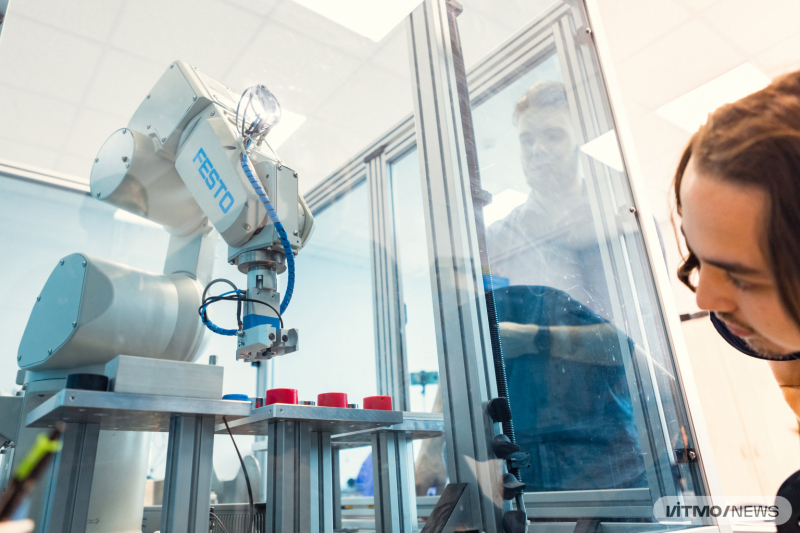
A laboratory at the Faculty of Control Systems and Robotics. Photo by Dmitry Grigoryev / ITMO.NEWS
Which areas of robotics are pursued at ITMO?
ITMO students have the chance to apply their knowledge and skills in projects carried out in collaboration with the university’s industrial partners. For one, beginning this year, majors in Robotics and Artificial Intelligence can join Sberbank’s Robotics Laboratory to work on cutting-edge R&D, such as creating a versatile “brain” and a smart body for a robot or a software stack compatible with different motion platforms and manipulators.
Among other student-involved projects is the development of a sensorless system for assessing the condition of the engine rotor in partnership with Diakont, which replaced a costly physical sensor; and the design of robots for oil and gas pipeline inspection in collaboration with Rosneft.
Robotics is one of three tracks curated by ITMO in I Am a Professional in partnership with Sberbank. The university also curates Programming and Information Technologies and Information and Cyber Security.
